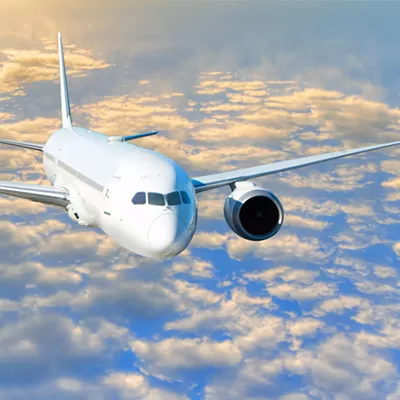"If hurricanes like Katrina go from once-in-a-century storms to once-in-a-decade-or-two storms, how many times are you going to rebuild it [New Orleans]?" wonders Bill McKibben, author of The End of Nature. "Even in America, there's not that kind of money -- especially if you're also having to cope with, say, the effects on agriculture of more frequent and severe heat waves, and the effects on human health of the spread of mosquito-borne diseases like dengue fever and malaria, and so on ad infinitum. Not to mention the costs of converting our energy system to something less suicidal than fossil fuel, a task that becomes more expensive with every year that passes."
Spokane Falls Community College President Mark Palek and several SFCC faculty have combined their intellectual passions to make sure students and the public learn about the ways "sustainability" can provide future leaders and decision-makers with economic, technological, human, cultural and legislative tools to plan for a world with more people, fewer resources and political chaos.
"The Long Emergency: One Earth, Colliding Futures," may feature author James Howard Kunstler, noted for books like The Geography of Nowhere and The Long Emergency, but the symposia also feature documentaries like The End of Suburbia, Empty Nets, Empty Oceans and a premiere of Robert Greenwald's Wal-Mart: The High Cost of Low Price to allow participants to contemplate ideas and predictions presented by thinkers not so connected to corporate mainstream ideology.
Also featured as part of the Oct. 11-14 week is a panel discussion with Kunstler; EWU technical writing professor and environmental author Paul Lindholdt; EWU planning professor and author Gabor Zovanyi; Christy Lafayette, with Futurewise and the Selkirk Conservation Alliance; and SCC philosophy instructor and ecology advocate Glen Cosby.
While Kunstler will focus on energy -- fossil fuel and its impending peak and the very expensive practice of relying on it as a source -- sustainability is a far-reaching concept. SCC's Cosby, for one, sees simplicity and fidelity in defining what sustainable life is: "The only truly sustainable form of life is a harmonious one. So I guess I'd define sustainability as a way of life that harmonizes wants and desires with natural conditions, instead of forcing nature into submission to our wants and desires, which has been the tendency in the West."
Energy is still a key component of sustainable design, planning and economic principles. Many leaders believe we should have long ago started shifting our priorities to a society with denser cities, much less sprawl, effective mass transportation systems and food security.
EWU's Lindholdt admits that energy is one of the bigger challenges for students in their futures: "If one believes in the responsiveness of markets, then the doubling of gas prices in the past two years should nudge manufacturers to develop alternative energies. Sadly, though, the have-nots will be in no position to afford those new technologies. I believe the energy crisis will deepen the divide."
Because the sustainability week at SFCC is called "The Long Emergency" and is tied to the year-long campus theme of "fear and hope in a changing world," one might see this as a gloom-and-doom series of events that will weigh heavy on students. Not so for Cosby: "One thing I try to do is to get [students] to search their souls and ask themselves whether consumer culture really has delivered the goods it has promised to them. I try to get them to think about what has truly enriched their lives thus far, and to think about what would really impoverish their existence if they had to do without it. Most of the time, consumer goods come pretty far down the list. I ask them to think about their relationship to places, to landscapes and to non-human animals."
The challenge with sustainability is to make it real -- not just an academic exercise -- and to show people how they have choices in terms of food, housing and recreation.
"Over the years of having taught environmental planning, I have continually been shocked by the degree of environmental and ecological illiteracy demonstrated by college students," says EWU's Zovanyi. "If that segment of our population is woefully uninformed as to the state of our relationship to the natural world, then the illiteracy of the general population must be significantly worse. If students don't attain at least a basic understanding of the degree to which our species has stepped over the line in terms of its relationship with our local and global ecosystems, then it will be difficult, if not impossible, to get them to relate to the consequences of 'the end of cheap oil' or the enormous threat associated with unsustainable growth."
While James Kunstler's provocative voice is one of the highlights of Sustainability Week, Oct. 11-14, SFCC Student Programs representatives regard their outdoor Sustainability Fair on Tuesday, Oct. 11, from 11:30 am-1:30 pm, as another way to raise awareness. At the fair, students, faculty, staff and the public will learn about the many local connections to sustainability -- and about all the advocates who are reinventing the wheel of this consumer-driven and oil-fueled society.
Eco-Depot, Living Green, Futurewise, Habitat for Humanity, Northwest Solar Electric, the Green Zone, Great Harvest Breads, Cravens, Quantum Coffee, Global Folk Art and Commuter Cars (the makers of the electric Tango) -- just to name a partial list of fair participants -- will surround a farmers' market selling local produce. To top it off, a live band -- the Honeybuckets -- will be playing to the crowd, rain or shine.
One of the proponents of buying local and organic produce is Evelyn Florio, a sociology instructor who stresses all sorts of "alternative" viewpoints in her Social Problems class at SFCC. Florio confronts her students to go beyond the prevailing consumer-driven paradigm. Typically students in her class learn about the dynamic and holistic platform of fair trade advocacy and those anti-globalization forces fighting mega-corporations.
Nic Hunt, who is SFCC's director of lectures on campus, sees SFCC students as underserved and neglected insofar as the public eye is concerned. Collectively, they're na & iuml;ve about the impending collision of forces tied to expensive oil and the energy "war" that will affect the very near future.
According to Hunt, a symposium on sustainability seems to be the way to begin lifting the veil of ignorance. Hunt, 24, who has worked on the 2004 Ralph Nader ballot drive in Portland and seen first hand how the power structure in government has a stranglehold on his future, says he wants students to be "shaken up" or awakened by the message that we need to plan communities under the rubric of sustainability.
Students at SFCC will be the main audience for the ideas that are broached during the summit, according to James Davidson, vice president of activities for SFCC. When Kunstler speaks Oct. 12 and then participates in a panel discussion the following day on campus, students will take the helm of the Q & amp; A sessions.
Hunt emphasizes that by attending the Kunstler events and the documentaries like The End of Suburbia, Empty Oceans, Empty Nets and Wal-Mart: High Cost of Low Price, the public will get a sense of how SFCC might design its future while embracing sustainability. For more information, contact Davidson or Hunt at 533-3338.
James Howard Kunstler lectures on Wednesday, Oct. 12, at 11:30 am at SFCC, Bldg. 15, 3410 W. Fort George Wright Dr., and at 7 pm at Whitworth College's Weyerhauser Hall, 300 W. Hawthorne Rd. On Thursday, Oct. 13, at 11:30 am, Kunstler will take part in a panel discussion in SFCC's SUB, Rooms A-B. That night at 7 pm, he'll lecture at Gonzaga University, 502 E. Boone Ave., in Cataldo Hall's Globe Room. The SFCC Sustainability Fair takes place on Tuesday, Oct. 11, from 11:30 am-1:30 pm outside the campus library, Bldg. 2. Two documentary films will be shown at SFCC's SUB, Rooms A-B: on Friday, Oct. 14, at 11:30 am, Empty Oceans, Empty Nets; and on Wednesday, Oct. 19, at 11:30 am, Supersize Me. Paul K. Haeder teaches at SFCC.














